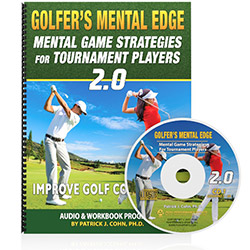Trying Harder in Golf Can Backfire
After a bad couple of bad holes or poor shots, do you try extra hard to try to make up for this and try to hit perfect shots?
This is a common trap for many of the perfectionist golfers I work with.
In sports, trying too hard or forcing play is referred to as pressing. Pressing is never an effective method to improve play or get shots back in a round.
Take the case of Marissa M…
Marissa is a scratch golfer who performs consistently well in practice rounds.
Marissa plays great in tournaments most of the time but she frequently runs into trouble after double bogeying a hole.
Instead of moving on from that hole and refocusing on her strategy for the next hole, Marissa tends to press, trying to make up those two strokes on the next hole.
When she tries to shoot for an eagle, Marissa is anxious and becomes obsessed with trying to make the perfect shot.
Marissa tends to tighten up on her tee shots and sends her drives off line… and when she putts, Marissa’s tense muscles often cause her to leave putts short.
In short, when Marissa presses, she often double bogeys again.
The key to playing with trust is a smooth, fluid stroke, which is enhanced by a relaxed mind and body.
Relaxation is enhanced when you are immersed in the present moment or when you are fully focused on the current shot.
When your mind time travels to the future, worry and tension increase, knocking you off your game and throwing off your mechanics.
Meijer LPGA Classic winner, 19-year-old Brooke Henderson, won her fourth LPGA Tour title, holding off Michelle Wie and Lexi Thompson by two strokes in the final round despite windy and wet conditions.
Despite her last win coming a year ago, Henderson stayed patient and didn’t press even as other golfers moved into striking distance.
The key to Henderson’s game is playing in the moment, one hole at a time.
At the 2017 KPMG Women’s PGA Championship, Henderson further expounded on how she is able to maintain her focus throughout a round of golf.
HENDERSON: “Definitely you need to have a strategy, and that’s what I’ve been really working hard on over the last three days, to get a strategy for each hole.”
Henderson credits her mental toughness for her ability to focus on the present when the pressure is on.
HENDERSON: “I think mentally I’m very strong, which has helped me out, especially on the tougher golf courses and in major championships.”
Henderson’s strategy can benefit your game too. After a bad hole, you may be tempted to make up a few strokes with one swing of the club.
Instead of getting overly focused on how many strokes you need to make up, pressing, or trying to make the perfect shot, focus on your strategy for the next hole.
You simply can’t get shots back from previous holes. They are gone. The only thing you can do is play on with composure and stick to your game plan.
How to Play On Without Pressing:
Again pressing comes from focusing on past mistakes, so the way to prevent pressing is to keep your mind occupied and immerse yourself in the present moment.
Remind yourself that the past is in the past and to grind out the rest of the round on the remaining holes.
Stick to your game plan for the course and know that each new hole is an opportunity for birdie or a solid par.
All you can do is play the remaining holes with composure and focus and add up your score at the end of the round.
And of course, make sure you review your mental game plan with “The Golfer’s Mental Edge” program before you hit the course!
Golfer’s Mental Edge

What’s the big sign that your mental game is the weak link in your golf game? When you can’t play consistently as well as when you play a practice or casual round–or your range game is way better than your game on the course. If you suffer from lack of focus, low self-confidence, poor composure or other mental game obstacles on the course, you can’t reach your true potential in golf.
The Golfer’s Mental Edge 2.0 Audio and Workbook program is ideal for any amateur, collegiate, junior, and tour professional golfer.
Golf coaches and instructors would also be wise to teach “The Golfer’s Mental Edge 2.0” principles to their players. This program is perfect for any golfer who wants to improve performance and consistency by managing their mind better on the course.

